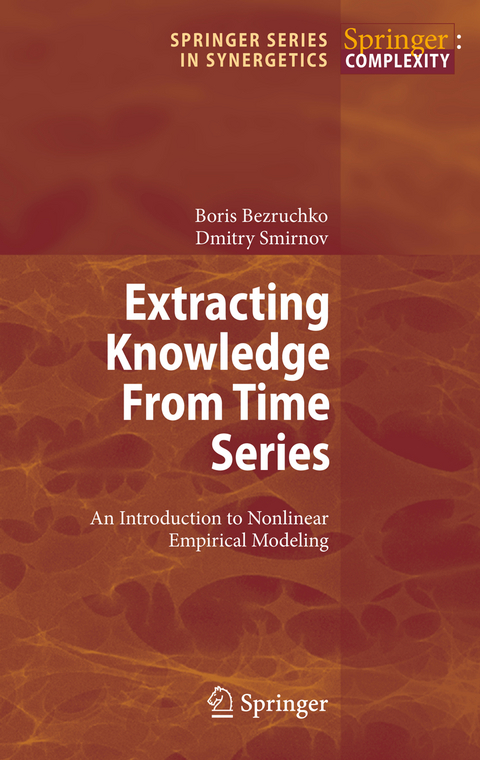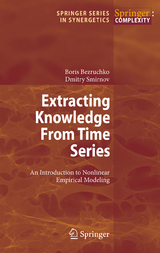Extracting Knowledge From Time Series
Springer Berlin (Verlag)
978-3-642-26482-5 (ISBN)
Mathematical modelling is ubiquitous. Almost every book in exact science touches on mathematical models of a certain class of phenomena, on more or less speci?c approaches to construction and investigation of models, on their applications, etc. As many textbooks with similar titles, Part I of our book is devoted to general qu- tions of modelling. Part II re?ects our professional interests as physicists who spent much time to investigations in the ?eld of non-linear dynamics and mathematical modelling from discrete sequences of experimental measurements (time series). The latter direction of research is known for a long time as "system identi?cation" in the framework of mathematical statistics and automatic control theory. It has its roots in the problem of approximating experimental data points on a plane with a smooth curve. Currently, researchers aim at the description of complex behaviour (irregular, chaotic, non-stationary and noise-corrupted signals which are typical of real-world objects and phenomena) with relatively simple non-linear differential or difference model equations rather than with cumbersome explicit functions of time. In the second half of the twentieth century, it has become clear that such equations of a s- ?ciently low order can exhibit non-trivial solutions that promise suf?ciently simple modelling of complex processes; according to the concepts of non-linear dynamics, chaotic regimes can be demonstrated already by a third-order non-linear ordinary differential equation, while complex behaviour in a linear model can be induced either by random in?uence (noise) or by a very high order of equations.
Models And Forecast.- The Concept of Model. What is Remarkable in Mathematical Models.- Two Approaches to Modelling and Forecast.- Dynamical (Deterministic) Models of Evolution.- Stochastic Models of Evolution.- Modeling From Time Series.- Problem Posing in Modelling from Data Series.- Data Series as a Source for Modelling.- Restoration of Explicit Temporal Dependencies.- Model Equations: Parameter Estimation.- Model Equations: Restoration of Equivalent Characteristics.- Model Equations: "Black Box" Reconstruction.- Practical Applications of Empirical Modelling.- Identification of Directional Couplings.- Outdoor Examples.
From the reviews:
"Extracting knowledge from time series is a very neat title-it exactly encapsulates the topic which the authors hope to cover in this volume. ... This is admirable, and the result is valuable. ... This is overall a useful volume for providing an overview of the area ... ." (Michael Small, Mathematical Reviews, Issue 2012 d)
"Another book on time-series! ... it is a textbook for physicists and practitioners, and in this way of thought it is welcome. Its main purpose is to explain and illustrate how time series can be used to construct mathematical models for dynamical systems. ... step by step the applications supports the presentation of the basic theoretical formulation." (Guy Jumarie, Zentralblatt MATH, Vol. 1210, 2011)
| Erscheint lt. Verlag | 5.11.2012 |
|---|---|
| Reihe/Serie | Springer Series in Synergetics |
| Zusatzinfo | XXII, 410 p. 162 illus. |
| Verlagsort | Berlin |
| Sprache | englisch |
| Maße | 155 x 235 mm |
| Gewicht | 658 g |
| Themenwelt | Mathematik / Informatik ► Informatik ► Theorie / Studium |
| Naturwissenschaften ► Physik / Astronomie ► Theoretische Physik | |
| Naturwissenschaften ► Physik / Astronomie ► Thermodynamik | |
| Schlagworte | chaotic signals • model equations • Modeling • modeling and forecast • nonlinear dynamical systems • Quantitative Finance • Sets • stochastic model • stochastic models • Time Series Analysis |
| ISBN-10 | 3-642-26482-4 / 3642264824 |
| ISBN-13 | 978-3-642-26482-5 / 9783642264825 |
| Zustand | Neuware |
| Informationen gemäß Produktsicherheitsverordnung (GPSR) | |
| Haben Sie eine Frage zum Produkt? |
aus dem Bereich




